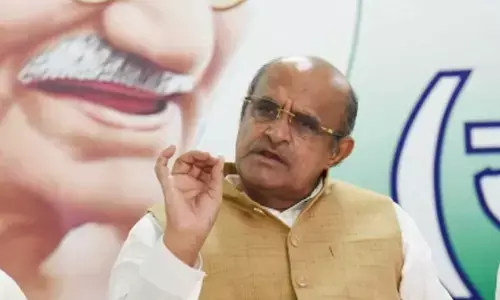Stay focused on defined goals, stick to discipline

The market has remained volatile for the last few weeks heightened by the geo-political developments and the rising inflation. The repercussions of war have begun impact the common man with the food inflation inching up even as the energy prices continued to soar.
The market has remained volatile for the last few weeks heightened by the geo-political developments and the rising inflation. The repercussions of war have begun impact the common man with the food inflation inching up even as the energy prices continued to soar. Unfortunately, both these are interrelated and the resultant spiral is only going up.
Much of the energy costs are also again due to the supply chain issues and the political intervention due to the ongoing Russia-Ukraine conflict. While the former provides a sizable contribution to the energy security of the world the latter assures the food security of the world. Add to that, the weather conditions have only exacerbated the food production with droughts in Brazil in the last couple of years and an extreme heat wave hitting this crop season in parts of India.
The central banks in a bid to control the inflation have begun to withdraw the additional liquidity that was provided during the pandemic. Also, they started to increase the interest rates in a bid to improve the cost of capital so that the capital is wisely deployed. The easy money policies of the last decade and the excess liquidity during the pandemic had also added a flavor to the current inflationary bout. But the real problem lies in the supply side than the demand side. What the central banks are now attempting is to control the demand side, which they have the tools for.
This limited approach by the central banks mayn't provide the preferred results and it would mean some undesired consequences like contraction of demand and hence the stunting of economic growth. So, the proposed dot plans of the central banks could derail once they realize that these measures impede the growth prospects leading to a pause or even a reversal in the stance. For now, though, the asset markets are discounting the high probability of an impending recession. This makes it clear that no one is sure of future and how it transpires.
As an investor this is the time to stay focused on the defined goals and stick to discipline. The continuation of good work i.e., not turning the notional losses to real, investing in staggered way in equities through systematic plans and adhering to asset allocation. One more important thing an investor should do is to cut the noise, the constant bickering of news of economic doom, etc. True, it gets better after it only turns worse but that shouldn't alter your long-term goals. Yes, one could tweak the way one approaches the market but not out of their risk appetite or timelines. Investors are hence recommended to stay the course and live through this tough phase where they would witness drawdowns in their portfolios. This is the reason to have a balanced asset allocation which reflects the risk appetite of the investor. A proper asset allocation allows investors to diversify across different assets and among the asset sub-classes so that the drawdowns don't completely impact the portfolio.
For instance, an exposure to hybrid funds like balanced advantage funds which have both the equity and debt allocations along with the equity arbitrage would help investors to hedge the risk of equity exposure even as the debt allocation balances out the volatility risk. Thus, the investor would not only counter the drawdowns substantially but stand to gain from the contrary allocation to debt. Similarly, asset allocation or multi-asset funds would help investors to diversify across gold, real estate through (Real Estate Investment Trusts) and other exposures would certainly add to the returns in these times. Moreover, the lower drawdowns allow them to recover quickly and get back to winning ways sooner.
(The author is a co-founder of 'Wealocity,' a wealth management firm and could be reached at [email protected])
















